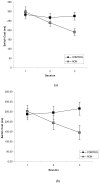Can training in a real-time strategy video game attenuate cognitive decline in older adults?
- PMID: 19140648
- PMCID: PMC4041116
- DOI: 10.1037/a0013494
Can training in a real-time strategy video game attenuate cognitive decline in older adults?
Abstract
Declines in various cognitive abilities, particularly executive control functions, are observed in older adults. An important goal of cognitive training is to slow or reverse these age-related declines. However, opinion is divided in the literature regarding whether cognitive training can engender transfer to a variety of cognitive skills in older adults. In the current study, the authors trained older adults in a real-time strategy video game for 23.5 hr in an effort to improve their executive functions. A battery of cognitive tasks, including tasks of executive control and visuospatial skills, were assessed before, during, and after video-game training. The trainees improved significantly in the measures of game performance. They also improved significantly more than the control participants in executive control functions, such as task switching, working memory, visual short-term memory, and reasoning. Individual differences in changes in game performance were correlated with improvements in task switching. The study has implications for the enhancement of executive control processes of older adults.
Copyright (c) 2009 APA, all rights reserved.
Figures




References
-
- Bherer L, Kramer AF, Peterson JS, Colcombe S, Erickson K, Becic E. Training effects on dual-task performance: Are there age-related differences in plasticity of attentional control? Psychology and Aging. 2005;20:695–709. - PubMed
-
- Bopp KL, Verhaeghen P. Aging and verbal memory spans: A meta-analyses. The Journals of Gerontology Series B: Psychological Sciences and Social Sciences. 2005;60:223–233. - PubMed
-
- Braver TS, Barch DM. A theory of cognitive control, aging cognition, and neuromodulation. Neuroscience and Biobehavioral Reviews. 2002;26:809–817. - PubMed
-
- Clark JE, Lanphear AK, Riddick CC. The effects of videogame playing on the response selection processing of elderly adults. Journals of Gerontology. 1987;42:82–85. - PubMed
Publication types
MeSH terms
Grants and funding
LinkOut - more resources
Full Text Sources
Other Literature Sources

